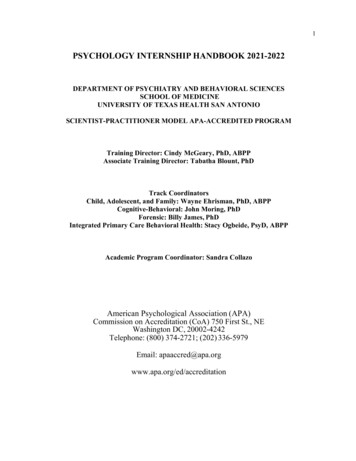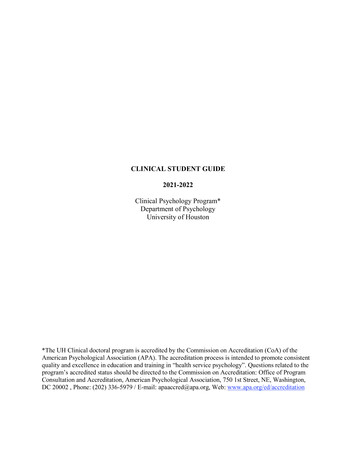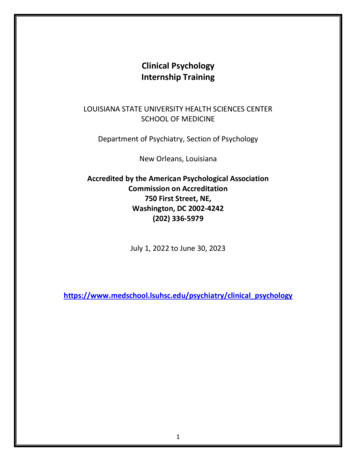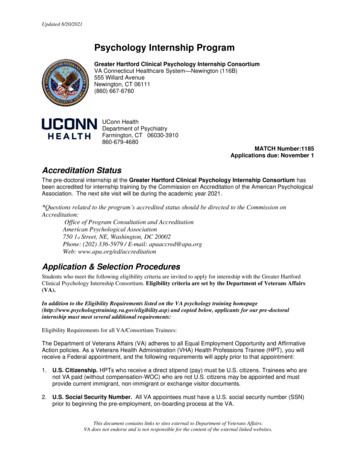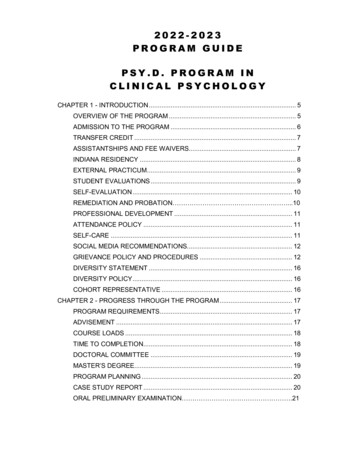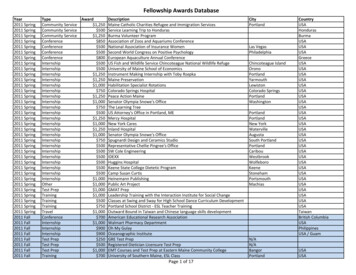
Transcription
ABBREVIATED CLINICAL PSYCHOLOGY INTERNSHIP HANDBOOK
PREFACEThis abbreviated handbook describes the doctoral Clinical Psychology Internship Program (CPIP)located at Womack Army Medical Center (WAMC), Fort Bragg, North Carolina. The CPIP Internshipis intended to prepare graduates to provide world-class behavioral health services to Service Membersworldwide. Full handbook available upon request.Accreditation: The Womack Army Medical Center Clinical Internship Program is fully accredited bythe American Psychological Association (APA), which may be verified by contacting the APA.Office of Program Consultation and AccreditationAmerican Psychological Association750 First Street, N.E.Washington, D.C., 20002-4242(202) 336-5979Website: amsFor additional information about the CPIP, please contact the Program om-wamc.mbx.coprprogramdirector@mail.milTRAINING PHILOSOPHY, OBJECTIVES, AND OVERVIEWPhilosophy: The Clinical Psychology Internship Program (CPIP) is an APA-accredited internshiplocated at Womack Army Medical Center (WAMC), in Fort Bragg, North Carolina. Our primarymission is to produce highly qualified, resourceful and autonomous professional psychologists, with thecompetencies and professional identity that will serve as a solid basis for an Army career. APractitioner-Scholar model guides Internship training at WAMC, with an emphasis on clinical practicevalidated by empirical research. Our training goals are directly related to career outcomes, and Internsare thus being prepared for the dual career of clinical psychologists and military officers.Interns have access to a wide range of opportunities designed to build mastery of core clinical skills inadult assessment, evidence-based psychotherapeutic interventions, and clinical consultation. Internshave opportunities for specialty training in cognitive assessment, personnel selection, health psychology,and postconcussive evaluations. By the end of the training year, Interns gain competency commensuratewith entry-level readiness for independent practice in using an integrative approach to examination andintervention, linking the science of psychology with practical treatment outcomes.At WAMC, special emphasis is placed on developing the Intern's ability to provide efficient clinicalservices to a large and diverse population of primarily Active Duty military Service Members. Theprogram employs an integrative model of assessment and training that best fits the Interns’ futurepractice in their careers as Army psychologists, both in deployed settings as well as during non-deployedassignments across the USA and worldwide locations.Training Aims: The aims of this CPIP training program are to foster the development of a number ofcore competencies identified by all Army Clinical Psychology Internship Programs as being essential tothe practice of clinical psychology within an Army setting (military-specific competencies). In addition,the CPIP incorporates the objectives of the Assessment of Competency Benchmarks developed by the2
APA Board of Educational Affairs in collaboration with the Council of Chairs of Training Councils(CCTC). These domains are not mutually exclusive and naturally overlap and interrelate. Below are thesummarized profession-wide competency domains for the CPIP Internship program.ResearchEthical and Legal StandardsIndividual and Cultural DiversityProfessional Values, Attitudes, and BehaviorsCommunication and Interpersonal n and Interprofessional/Interdisciplinary SkillsPre-Internship Requirements: The following doctoral degree requirements must be completed prior toentrance into the Army: (1) All required coursework, (2) written and oral comprehensive examinations,(3) pre-internship practica, and (4) acceptance of dissertation/clinical research project proposal. Thoughnot required, it is highly recommended that dissertation/clinical research project data collection iscompleted before the start of internship. Dissertation/clinical research project completion and universitygraduation (or documentation of completion of all graduate school requirements), are both required priorto the start of the Womack Army Medical Center Clinical Psychology Residency Program (CPRP).Post-Internship Options: While the majority of recently graduated interns remain at WAMC for thesecond year CPRP, CPIP graduates may pursue one of two options following successful completion ofthe internship and graduation from their doctoral program: Option 1: Enroll in the 12-month WAMC CPRP which includes an optional three-month rotationof their choice in the areas of Operational Psychology, neuropsychology, or Clinical Research. Option 2: CPIP graduates may decline participation in the follow-on residency year and insteadimmediately obtain orders for their next Army assignment. However this option requiressubstantial preparation for licensure during the internship year, obtaining licensure within twomonths of graduation from the doctoral program, and approval by the Program Director.PROGRAM OVERVIEWOverview: The CPIP internship year is comprised of a two-week orientation period followed by arequired nine-month clinical rotation, followed by one of three elective rotations.Required Rotation: Adult Outpatient/Military Psychology (Behavioral Health Officer) Rotation:Training at WAMC is designed to prepare Interns for the requirements of Active Duty service as amilitary psychologist, which includes the need to practice all of the major professional skills across agiven week. Instead of training each of the major skills in separate three-month rotation experiences asoccurs at most sites, in this program Interns learn to balance all the skills of professional psychologistsduring an extended nine-month BHO Rotation. Our philosophy is that this is the same way that ourgraduates will be expected to function as military psychologists upon completion of training. Our“Train-as-You-Fight” model uses a developmental approach to help Interns to gradually acquire all ofthe competencies for becoming professional psychologists with no periods to allow attrition ordegradation of skills. Therefore, our Interns learn how to conduct behavioral health evaluations andprovide follow-up treatment/disposition of Active Duty patients, referred from a wide range of referralsources, with a variety of presenting problems. At the same time, they also carry a limited caseload ofpsychotherapy patients, and engage in supervised outpatient individual and group therapy practices.Interns concurrently learn how to assess and manage risk for self-directed and other-directed aggression3
on an outpatient basis, as well as how and when to move patients to more intensive or controlledtreatment environments. Interns also conduct military-specific evaluations including Security Clearanceevaluations, Fitness for Duty evaluations, and suitability screenings for Army specific schools. Internsare simultaneously supervised on conducting psychological testing, preparing professional reports, andproviding test feedback to a wide variety of referral sources. Finally, Interns receive supervision ofsupervision they provide to paraprofessional staff members, in a layered supervision approach.On this rotation, Interns also receive training and supervision in evidenced-based treatment models (e.g.,Cognitive Behavioral Therapy [CBT], Prolonged Exposure therapy [PE], Cognitive Processing Therapy[CPT], and/or Cognitive Behavioral Therapy for Insomnia [CBT-I]. Interns typically carry one to twocases in which evidence-based interventions are implemented. The overall objective is for Interns togain competency in using an integrative approach to evaluation and intervention, linking the science ofpsychology with positive practical outcomes, in a training model that familiarizes them with andprepares them realistically for future Army assignments.Elective Rotation 1 – Operational Rotation:The Operational Rotation serves as an introduction to military Operational Psychology. This rotationprovides Trainees opportunities to observe and practice the fundamentals and skills involved in threeareas: (1) specialized occupational assessment and selection, (2) leadership development and coaching,and (3) performance enhancement skills for individuals and teams. This rotation consists of three days aweek for three months focused on understanding the literature and instruments involved in assessmentand selection, instruction and training in persuasion and influence, and observation of how to utilizethese skills to support operations. Interns will have the opportunity to complete a written product ineach of the three areas under supervision, with verbal and written feedback provided. The rotationfocused on exposure to the myriad psychological domains involved in supporting military OperationalPsychology as opposed to a mastery of these skills.Elective Rotation 2 – TBI Clinic Rotation:Interns making adequate progress in training may spend three days per week for three months at theNational Intrepid Center of Excellence (NICoE) satellite located at Fort Bragg. Interns receive anintroduction to neuropsychological principles, develop understanding of the basics of traumatic braininjury evaluation, and receive exposure to treating post-concussive symptoms for Service Members inboth individual and group formats. Under the supervision of a licensed neuropsychologist, Interns alsolearn the fundamentals of cognitive assessment and neuropsychological report writing.Elective Rotation 3 – Primary Care/Health Psychology:On this rotation, Interns spend three days per week for three months receiving education and supervisionon functioning as a Behavioral Health Consultant within a primary care medical clinic. Interns learnhow to complete rapid evaluations of patients presenting with a variety of symptoms and concernsincluding but not limited to anxiety, insomnia, weight reduction, treatment adherence, lifestylemanagement, tobacco cessation, sex education, and diabetes management. Interns learn to provide brief,targeted interventions and make dispositional recommendations to medical providers. Interns also learnhow to assist patients with increasing motivation for behavioral change.Elective Rotation 4 (under development) - Child and Family Behavioral Health Services (CAFBHS):CAFBHS provides clinical psychology and psychiatry services to children and adolescents between theages of four to eighteen and to adult dependent spouses. Clinical services include Individual, couples,and family therapy with integration of parent training interventions. Components of this rotation include4
assessment, treatment, and risk management for members of military families. The School BehavioralHealth Program, a component of CAFBHS, affords opportunities to provide clinical services in a schoolsetting and participate in multidisciplinary team collaboration.Transrotational/ Year Long RequirementsPosttraumatic Stress Treatment: During the course of the training year, Interns participate in atransrotation outpatient clinic for the treatment of patients diagnosed with PTSD. Evidence-basedtreatment approaches are used under supervision and following appropriate training.Supervision of Supervision: Throughout the course of the training year, including while on their electiverotations, Interns also continue to receive one hour of group supervision of supervision per week. Thislayered supervision is supervised by a licensed psychologist and has the explicit goal of helping Internsdevelop competency in clinical supervision. Interns meet weekly with Residents to discuss theirsupervision of 68Xs (Enlisted Behavioral Health Specialists).Internship Meetings: All interns attend a monthly professional development/mentorship meeting withthe Program Director. Interns also attend the quarterly All Hands department meeting.DidacticsDidactic Training: A comprehensive program of regularly scheduled seminars, lectures, and workshopsaccompanies the intensive direct supervision provided on all rotations. Didactic presentations aredesigned to provide Interns with state-of-the-art information and training relevant to effectivefunctioning as a psychologist in the Army.Cultural and Individual Differences and Diversity: Internship training emphasizes the development ofindividual and cultural sensitivity in the provision of clinical care, addressed through didactics,supervisory discussion, and via formal hospital-wide training events. Interns engage in self-reflectivepractice regarding issues of race, ethnicity, age, gender, and other unique characteristics. Interns areexpected to be sensitive and responsive to issues of cultural/individual diversity.Training HoursThe program ensures that all CPIP Interns receive the required supervised experiences necessary tofunction as Clinical Psychologists, and to meet the training requirements for various state licensingboards as well as the National Register of Health Service Providers in Psychology. This is understood tobe a minimum of 52 weeks or 2000 hours of supervised experience during the training year. Thetraining year consists of 12 calendar months from October to September.The Department of Behavioral Health and other clinics and services where Interns work typically haveduty hours equivalent to a 40-hour work week. However, for Interns to obtain the maximum trainingvalue, including assigned and self-identified reading, a minimum of 50 hours per week is typicallynecessary. It is recognized that most state licensing boards allow credit for only 40 hours per weektowards licensure requirements. Normal duty hours are 0700 hours to 1700 hours, Monday throughFriday, and include 60 minutes for lunch.Additional Functions, Roles and SupportStudent Leadership Roles: Each intern serves a term as the Chief Intern during the CPIP year. This is aleadership position and Interns are expected to approach their duties with professionalism suitable to amilitary officer. Duties include meeting with the Program Director as needed to discuss Intern concerns5
and receive information; conveying relevant information to fellow Interns; assisting with coordinatingspecial projects; coordinating intern involvement in special events (Military Ball, etc.); and hostingDistinguished Visiting Professors (DVPs).Intern Performance EvaluationSelf-Assessment/Initial Skills Assessment: A program level assessment of each Intern's skills isconducted prior to beginning the first rotation. This evaluation is used by the faculty to develop ageneral understanding of the Intern’s particular strengths and areas of growth so that training may beappropriately tailored to the Intern’s developmental needs. Remedial training may be employed toimprove relative areas of deficit. Interns also self-assess at the start of each rotation.Weekly supervision: Interns receive at least 4 hours of weekly scheduled supervision (individual andgroup). Supervision is intended to provide specific guidance regarding patient care, as well as to discussbroader clinical topics. Progress toward rotational competencies and learning goals is also reviewed.Performance Evaluations: Supervisors complete quarterly competency evaluations to help Interns gaugeperformance. A minimum ‘3’ rating in each domain is required by the end of each rotation, as well as atthe end of the year to complete the internship. In the event that an Intern's progress is consideredinadequate, increased supervision and/or modification of the training regimen will be discussed andinstituted as necessary. Should performance and progress not improve to predetermined, objectivelydefinable levels, processes to consider formal training status modification will be instituted.Developmental Support Form, Officer Evaluation Support Form, Officer Evaluation Reports, andIndividual Development Form: As military officers, Interns are rated on their military traits andperformance. The Officer Evaluation Support Form is used to communicate the Intern’s achievementsthroughout the rating period. Officers are rated annually by senior officers or senior staff members.Results become part of the Officer’s permanent service record to be used in the promotion process.The Individual Development Plan: The IDP is an informal dynamic training tool that aids in thedevelopment and tracking of training goals. The tool supports the APA requirement for individualizedtraining, increased Intern participation in identifying strengths and deficits, and tracking of measurablegoal achievement over the course of training. The IDP focuses on foundational competencies, rotationspecific skills, and dissertation progress, and is reviewed and updated quarterly by the Program Director.Intern Evaluation of Didactics Rotations, Supervision, and overall Internship Program: Interns completeevaluation of didactics upon completion of each professional speaker didactic. Interns complete arotation evaluation form and supervisor evaluation form upon completion of each rotation. Internssubmit a written critique of the training program in general at mid-year and at the end of the internship.Trainee identification on the critiques is optional.Administrative Policies and Procedures:The WAMC CPIP Program is committed to providing its Interns with a fair and effective learningenvironment. It is the intent that all policies, procedures, education, training, and socializationexperiences are characterized by mutual respect and courtesy between Interns and training staff, in amanner that facilitates Interns’ training and educational experiences. If an Intern believes that they arebeing treated unfairly or in any untoward manner, they can seek resolution of the problem by followingthe relevant GME policies and procedures outlined in the full handbook. A copy of the full programhandbook is available upon request.6
This abbreviated handbook describes the doctoral Clinical Psychology Internship Program (CPIP) located at Womack Army Medical Center (WAMC), Fort Bragg, North Carolina. The CPIP Internship is intended to prepare graduates to provide world-class behavioral health services to Service Members worldwide. Full handbook available upon request.
